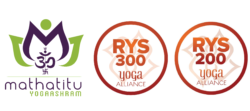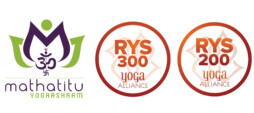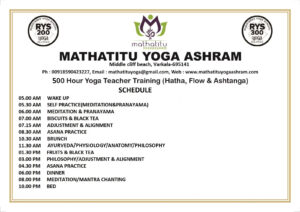500 Hours 58 Days Yoga & Ayurveda TTC
Book Your Seats
€ 200
500 Hours 58 Days Yoga & Ayurveda TTC
Our 58 Days 500 Hours Yoga TTC is a new concept in Yoga teacher training, designed to provide you with fundamental skills and confidence to teach yoga based on Hatha Yoga and Ashtanga Vinyasa lineages, in your way to become a RYT certified yoga instructor.
At Mathatitu Yoga Varkala, we understand the importance of balancing excellent teaching with affordable fees. As a Yoga Alliance accredited residential yoga school in Varkala, Kerala, India, we have the responsibility not only to offer our students the very best standard of learning, but also to keep our fees low,to be able to work towards our aim of making yoga classes accessible to all. Our belief in equality also means that our fees remain the same for both foreigners and Indians.Our main focus is on Hatha Yoga, but we believe in using the strengths from all styles of yoga, and so enable students to practice multi style yoga sessions and postures. We aim to train the students to enable them to teach all styles of yoga, promoting the unity that underpins our ideology.
Yoga Teacher Training Fees And Schedule
* A/C room will cost € 200 extra
* A/C room with sea view will cost € 400 extra
Price include accommodation, food and excursion, **Extra charges for AC
Our 58 Days 500 Hours Hatha, Ashtanga & Glow Yoga Teacher Training (YTT) Course is a RYT certified program aimed at developing yoga training skills and flexibililty, equipping you with all the desired skills of a traditional yoga master. The course will be conducted inside our Yoga Studios right in front of Varkala Beach, on the beach cliff.
Our Yoga teacher training course (Yoga TTC) will prepare students to learn and teach yoga asanas (postures) and meditation, using a step by step method underpinned by yoga philosophies and other related subjects (please refer to syllabus below). Our focus is not just to provide a Yoga Alliance Certification but to create a teacher who has a deep practical understanding of the yoga they wish to teach. Throughout the course we will endeavor to develop the student’s understanding of the need for self-practice. By the end of the course, the student will have the ability and confidence to teach at both beginner and advanced levels.
The curriculum covers the most essential topics from basic Asana practises to Hatha Yoga lessons in detail to philosophical sessions thus enabling students to learn and understand about yoga thoroughly to be the best version of the yoga teacher they can become.
- Hatha Yoga
- Introduction to Asanas (Hatha, Ashtanga and Vinyasa practice
- Pawanmuktasana Series 1, 2, and 3
- Hatha Sun Salutation and Moon Salutation
- Practice of various Asanas are mainly in the following categories:
▪ Standing postures
▪ Sitting postures
▪ Prone postures
▪ Forward and backward extensions
▪ Inversions
▪ Supine postures
▪ Relaxation postures
- Ashtanga Vinyasa ( Primary series & Introduction to secondary series)
- Introduction to Ashtanga Vinyasa Yoga
- Study and practice of the Primary Series, including:
▪ Sun Salutations A & B
▪ Standing sequence
▪ Sitting sequence
▪ Finishing sequence
- Focus on correct alignment and adjustments
- Focus on Breathing (Ujjai breath)
- Focus on Drishtis (focus points)
- Learning Sanskrit counting and names of the Asanas
- Daily practice sessions to experience a complete Ashtanga Vinyasa flow
- Iyengar Yoga
- Iyengar Yoga alignment techniques using props
- Yin & Restorative Yoga
- Ayurveda Theory and Practice
- Ayurveda basic massage course
- Introduction to singing bowl and aerial yoga
Yoga and Yogic Practices
- Etymology of Yoga
- Brief Introduction about the Origin and Development of Yoga
- Yoga – Aims and Objectives
- General Introduction to Darshanas with special reference to Sankhya and Yoga
- General Introduction to Four Paths of Yoga
- Principles of Yoga and Yogic Practices
- Guiding Principles for Yogic Practices
Introduction to Hatha Yoga
- Introduction to Hatha Yoga
- Introduction to important Hatha Yoga Texts with special reference to Hatha Pradipika and Gheranda Samhita
- Causes of Success (Sadhaka Tattwa) and Causes of Failure (Badhaka Tattwa) in Hatha Yoga Sadhana
- Concept of Ghata and Ghata Shudhhi in Hatha Yoga
- Purpose and Utility of Shat Kriyas in Hatha Yoga
- Purpose and Utility of Asanas in Hatha Yoga
- Purpose and Importance of Pranayama in Hatha Yoga
Introduction to Patanjali Yoga
- Definition, Nature and Aim of Yoga according to Patanjali
- Concept of Chitta and Chitta Bhumis; Chitta Vrittis and Chitta Vrittinirodhopaya (Abhyasa and Vairagya)
- Concept of Ishwara and Ishwara Pranidhana
- Chitta Vikshepas (Antarayas) and their Associates (Sahabhuvas)
- Concept of Chitta Prasadana and their Relevance in Mental Well-being
- Kleshas and their significance in Yoga
- Ashtanga Yoga of Patanjali: Its Purpose, Effects and Significance
Introduction to Human Systems, Yoga and Health
- The Nine Systems of the Human Body
- Functions of the different Systems of the Human Body
- Introduction to Sensory Organs
- Neuro-muscular Co-ordination of Sensory Organs
- Basic Understanding of Exercise Physiology
- Homeostasis
- The Benefits of various Asanas on different parts of the Human Body
- Limitations and Contra-indications of specific Yoga Practices
Yoga for Wellness
- Health: Meaning and Definitions
- Concept of Pancha Koshas
- Yogic Conceptions of Health and Diseases
- Interdependency of physical (Prakriti) and psychological (Triguna) components according to Ayurveda
- Concept of Panchamahabhutas
- Yogic Principles of Healthy Living
- Introduction to yogic diet and nutrition
Yoga and Stress Management
- Human psyche: Yogic and modern concepts, behaviour and consciousness
- Frustration, conflicts, and psychosomatic disorders
- Relationship between mind and body
- Mental hygiene and role of Yoga in mental hygiene
- Mental health: a Yogic perspective
- Prayer and meditation for mental health
- Psychosocial environment and its importance for mental health (Yama and Niyama)
- Concept of stress according to modern science and Yoga
- Role of Yoga – Stress and Life Style Management
Familiarity with Body Joints and Vyayama
- Movement of Key Joints
- Sukshma Vyayama
- Shat Kriyas
Suryanamaskar and Asanas
- Introduction to Suryanamaskar (The Sun Salutation)
- Technique of Suryanamaskar Practice
- Asanas
- Five Spinal Movements in Yoga
Pranayama and Meditation
- Introduction to Pranayama
- Meditation – The Concept
- Practical Techniques of Meditation
Teaching Practice
- Teaching Yoga
- Principles and Skills for Educating Aspirants
- Teaching Yoga in a Group Setting
- Accommodation
- Healthy Food
- Course Date
- How to Reach Us
- FAQ
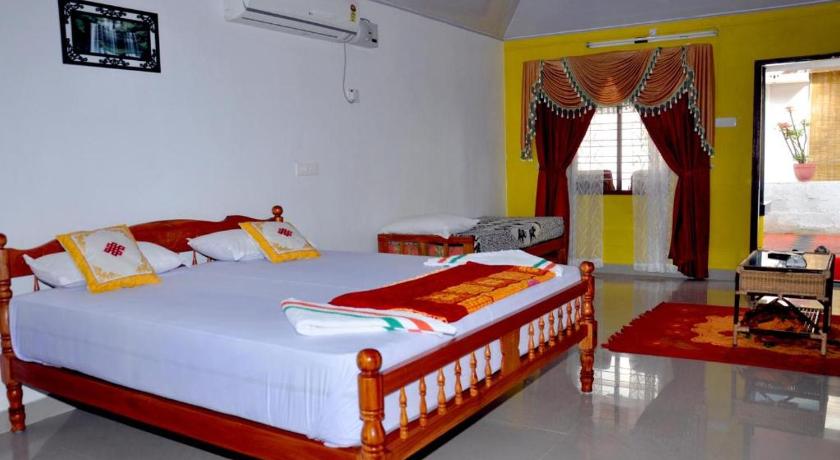
Each of our rooms in all our Resorts are spacious, fresh and comes with all essential amenities at your disposal. We have lounges and sit-out areas where you can share some quality time and chat with your fellow participants of the program.
We take well care of our environment and premises so much that we keep it clean and bright. All the places like your yoga studios, dining area, and your rooms will be close to each other and right in front of or near to our resorts, you have the majestic beaches across India and Nepal, basking in the sun, in all its glory!
- Shared Accommodation – It includes facilities for two persons. We provide two single beds, shower service, European toilets, reading lights, wardrobes, window curtains, clean and fresh bed sheets, pillow covers, 2 pillows and clean blankets. You will have access to free Wi-Fi and intercom.
- Private Accommodation- It includes facilities for a single person. They can choose between a usual yet spacious private room accommodation or a Sea-View accommodation that offers a picturesque view of the Varkala Beach, while sitting in the balcony We provide a single bed, shower service, European toilet, reading lights, wardrobe, window curtains, clean and a fresh bed sheet, pillow cover, 1 pillow and a clean blanket. You will have access to free Wi-Fi and intercom. (Please note that the tariff would change for a sea-view accommodation).
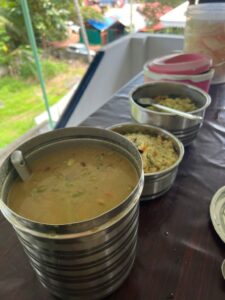
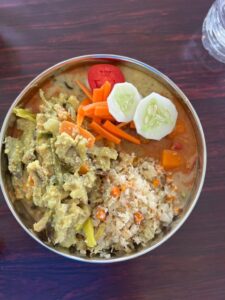
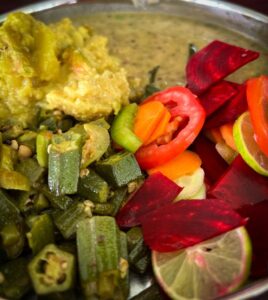

Balanced and nutritious diet forms the basis for the nourishment of mind and body. Mathatitu Yoga Ashram offers the purest vegetarian food, three times a day during your stay in our Ashram. Carefully cooked foods with traditional ingredients offering amazing healing properties are provided to you in correct proportion. We hire specially trained chefs for our yoga students and trainers.
Breakfast includes light and protein-rich foods such as porridge, bread-toast, salads, sprouts, nuts along with tea, coffee, and fresh fruit juices. The lunch features a traditional Indian Ayurvedic Thali with rice, chapati, lentils, vegetables, salads, and yogurt. The dinner is a combination of Ayurvedic food and cooked vegetables, raw salad, fruits, and herbal tea.
About Food:
- Home cooked healthy organic meals 3 times a day and energy drinks.
- Vegetarian, Gluten free and Vegan is also available.
- Clean filtered water is available.
- 03rd Jan – 28th Feb
- 03rd Mar – 30th April
- 03rd Nov – 30th Dec
By Airways
From Trivandrum International Airport, hire a taxi and reach our Ashram situated 45 KMs from the airport, which takes barely 1 hour 30 minutes one-way. You may ask the taxi driver to drop you at Keratheeram Beach Resort, situated at Beach Cliff, Varkala.
By Roadways
From Varkala railway station, it just takes 4 KMs to reach Mathatitu Yoga Ashram (situated in Keratheeram Beach Resort), Middle Cliff Beach, Varkala. Hire a tuk-tuk (rikshaw) at around Rs.120/- one way.
By Railways
From Varkala railway station, it just takes 4 KMs to reach Mathatitu Yoga Ashram (situated in Keratheeram Beach Resort), Middle Cliff Beach, Varkala. Hire a tuk-tuk (rikshaw) at around Rs.120/- one way.
Q: IS THE ASANA TRAINING INTENSIVE?
A: No, the asana training is not intensive and is designed to keep it as simple as possible. The theory course focuses on achieving a holistic knowledge of yoga and gaining the skills necessary to teach yoga to others with awareness and understanding.
Q: DO I NEED TO FOLLOW ANY ETHICAL GUIDELINES?
A: Yes, some very simple guidelines are there to help you create a sattvic (yogic) environment, useful to learn which all trainees need to adhere to. Trainees in residence are not allowed to consume drugs, alcohol, and cigarette. They are also asked to maintain silence.
Q: HOW MUCH TIME SHOULD I EXPECT TO SPEND ON MY OWN ASANA PRACTICE?
A: You are expected to have minimum daily practice. 30 minutes of asana, 10 minutes of Pranayama and 20 minutes of meditation is compulsory.
Q: WILL I GET AN OPPORTUNITY TO TAKE CLASSES WHILE TRAINING?
A: Yes indeed you would get the golden opportunity to teach your fellow trainees under the supervision of a senior teacher.
Q: DO I NEED ANY KIND OF EXPERTISE TO ENROLL IN THE YOGA TEACHER TRAINING COURSE?
A: No, there is no special expertise that you require.
In fact, anyone irrespective of their age can join this yoga training program. Flexibility and strength are enhanced by your practice. The presence and guidance of a Master will deepen your yoga asana practice and awareness level. If you are into yoga training from quite some time this course would be an added advantage for you. Your awareness at the mental and physical level would be taken to a new high and it would eventually enhance your Yoga teaching skills for future.
